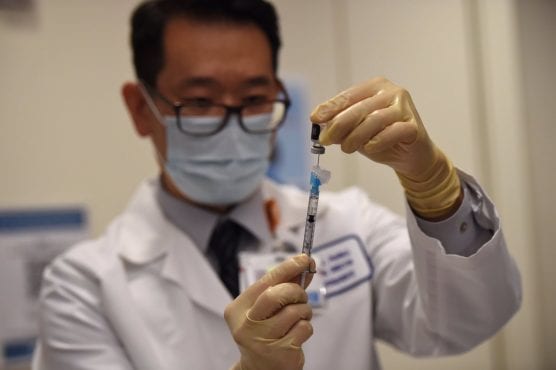The Pfizer vaccine against COVID-19 is safe and strongly protective in younger teenagers, early data from the company show, based on trials in kids as young as age 12.
An unpublished study including 2,260 adolescents between ages 12 and 15, given doses three weeks apart, found zero cases of COVID-19 among those who were fully vaccinated. There were 18 cases among those who were given a placebo.
The younger trial participants showed antibody responses that exceeded what researchers saw in trials of people ages 16 to 25, Pfizer noted in a press release Wednesday.
The company plans to submit its data to the Food and Drug Administration as a proposed amendment to their emergency use authorization.
Andy Slavitt, the White House’s senior adviser for COVID-19 response, tweeted about the Pfizer vaccine results on Wednesday, calling them “good and promising news about teens & vaccinations,” and noting that the FDA will study the data fully after they are submitted.
Pfizer said it hopes to begin vaccinating people down to age 12 before the start of the next school year.
“We share the urgency to expand the authorization of our vaccine to use in younger populations and are encouraged by the clinical trial data from adolescents between the ages of 12 and 15,” said Albert Bourla, Pfizer’s chairman and chief executive officer.
The Pfizer vaccine is currently the only one of the three approved in the United States that is allowed to be used for 16-year-olds, with the other two vaccines fully tested in people ages 18 and up.
Since adults are at higher risk of getting sick from the virus that causes COVID-19, vaccines were tested first in adults. Children represent about 13% of COVID-19 cases in the U.S., and at least 268 kids have died from the disease.
Experts say that vaccinating kids — who make up nearly a quarter of the country’s population — will be key to ending the pandemic.
Separate studies of vaccine effectiveness and safety in kids are important because children’s immune responses can be different from those of adults.
Scientists pay close attention to systemic vaccine side effects in kids — fever, malaise, poor appetite, vomiting — because those symptoms can also be signs of other illnesses in children, including meningitis or pneumonia.
“A child who has fever is evaluated sometimes a little bit differently than an adult who has fever,” said Dr. Archana Chatterjee, pediatric infectious disease specialist and the dean of the Chicago Medical School, who is on the FDA expert panel charged with recommending vaccine authorization.
“So those safety data for children are particularly important,” Chatterjee said.
Pediatricians have also noted that, even though kids seem to be less prone to serious illness, the upheaval of daily life has perhaps been harder for children than for any other age group.
Kids have had to skip sports and band practice, take classes from home, and conduct most of their social activity via the internet, noted Dr. James Campbell, a pediatric infectious disease specialist and professor at the University of Maryland School of Medicine.
“They bear a great burden in our society for this pandemic, even if the infection itself has not been as severe,” Campbell said during a recent interview. “The ramifications of the infection for their lives have been very severe.”
Moderna expects results by midyear in a study of its vaccine in people ages 12 to 17. Both Pfizer and Moderna have received FDA approval to begin studies in kids 11 and younger.
Johnson & Johnson is also testing ages 12 to 18 and has announced plans to test their vaccine in infants as soon as those trials are completed.
— By Nina Pullano, Courthouse News Service
Like this:
Like Loading...
Related





 Tweet This
Tweet This Facebook
Facebook Digg This
Digg This Bookmark
Bookmark Stumble
Stumble RSS
RSS


























REAL NAMES ONLY: All posters must use their real individual or business name. This applies equally to Twitter account holders who use a nickname.
0 Comments
You can be the first one to leave a comment.